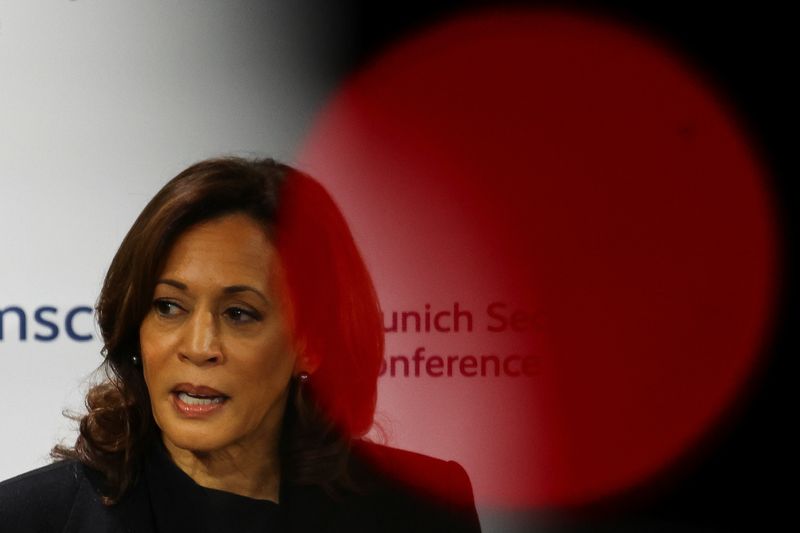By Humeyra Pamuk
MUNICH (Reuters) -U.S. Vice President Kamala Harris said the death of Russian opposition politician Alexei Navalny in an Arctic penal colony on Friday, if confirmed, would be a further sign of the brutality of Russian President Vladimir Putin.
Reports of Navalny's death shook the annual Munich Security Conference where leaders are gathered to bolster unity in the midst of Russia's two-year-old invasion of Ukraine.
U.S. President Joe Biden has dispatched Harris to the Munich conference in recent years, and on Friday he was headed to East Palestine, an Ohio town that has struggled with the aftermath of a fiery train derailment a year ago.
Harris emphasized that the U.S. would never retreat from its NATO alliance obligations put in place after World War Two, contrasting Biden's approach to global engagement with presidential election hopeful Donald Trump's isolationist views.
"Our commitment to build and sustain alliances has helped America become the most powerful and prosperous country in the world," she said. "To put all of that at risk would be foolish."
Harris voiced skepticism of Russia's official explanation that Navalny fell unconscious and died after a walk at the penal colony.
"Let us be clear, Russia is responsible," she said, adding it would be "a further sign of Putin's brutality" if the death is confirmed.
Speaking before Harris, U.S. Secretary of State Antony Blinken said that if reports of Navalny's death were accurate, they underscored Russia's "weakness and rot."
Shortly after Harris' remarks, Alexei Navalny's wife Yulia took the stage to a standing ovation and called on foreign powers to unite and fight the "horrific regime" in Russia. Harris met with her on the margins of the conference and "expressed her sorrow and outrage" over reports of her husband's death, a White House official said.
Biden had warned Putin after meeting the Russian leader in Geneva in June 2021 that Russia would risk "devastating" consequences if Navalny died in prison. Since then, U.S. relations with Russia have been in a steep downturn over the Ukraine war.
NATO QUESTIONS
Harris and Blinken attended the gathering less than a week after Trump, the frontrunner for the Republican presidential nomination, said he would not defend NATO allies who failed to spend enough on defense from a potential Russia invasion.
Biden is likely to face Trump in November in what looks like a tight rematch of their 2020 contest. Trump's NATO comments have shocked Europe and Trump-supporting Republicans in Congress are blocking aid for Ukraine's defense against Russia.
Harris is scheduled to meet U.S. lawmakers, Ukrainian President Volodymyr Zelenskiy, German Chancellor Olaf Scholz, Israeli President Isaac Herzog and Iraqi Prime Minister Mohammed Shia al-Sudani.
Harris, whose remarks were direct and forceful, is being watched for her ability to lead amid questions over Biden's age as he seeks a second term. He is 81 and Trump is 77.
"Make no mistake, the American people will meet this moment, and America will continue to lead," Harris said, remarks intended to reassure Europeans that Biden will be re-elected.
Biden's presidential re-election campaign on Friday released a new minute-long advertisement blasting Trump for abandoning NATO. They planned to target the ad to 2.5 million American voters in Michigan, Wisconsin, and Pennsylvania who trace their ancestry to the NATO states bordering Russia.
Russia's invasion of Ukraine has brought war to a continent that has spent decades trying to forge peace, underwritten by U.S. security commitments to the NATO military alliance that Trump has threatened to jettison.
The number of NATO nations meeting a defense spending target of 2% of GDP has doubled since Biden became president in 2021, Harris said.
Russia, meanwhile, has suffered more than 300,000 casualties in the Ukraine war and depleted its military's stockpile, she said, calling it an "utter failure for Russia."

Failing to stand up to Russia could mean its "imperialist authoritarian" leader invades other countries, she said, criticizing an isolationist mentality that is "dangerous, destabilizing and indeed short-sighted."
The Senate approved a $95.34 billion military aid package for Ukraine and other countries on Tuesday, but the funding may never be put up for a vote in the Republican-controlled House of Representative because of Trump's opposition.
(Additional reporting and writing by Steve Holland and Trevor Hunnicutt in Washington, Editing by Heather Timmons, Timothy Heritage, Chizu Nomiyama and Daniel Wallis)